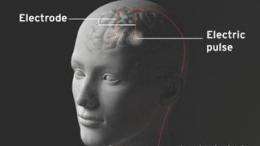EPFL Deep Brain Stimulation spin-off raises 10 million Swiss francs

One of the biggest financing rounds for furthering the work of a doctoral student has just been completed at EPFL. The microscopic electrodes developed by André Mercanzini – which are currently in clinical trials – could revolutionize Deep Brain Stimulation.
The microelectrodes developed by André Mercanzini should generate a lot of interest from investors: they have the potential to reduce side-effects, the risk of complications, and cost. At a time when Deep Brain Stimulation (DBS) has an increasing number of applications – such as the treatment of pain relief, epilepsy and depression – the market for these products is estimated to be around 450 million Swiss francs. “It should grow at about 25% each year,” notes Jean-Pierre Rosat, CEO of Aleva Neurotherapeutics. The start-up, launched by the young scientist in 2008, has just completed a round of financing that raised 10 million francs, thanks to BiomedInvest AG, BB Biotech Ventures III, Initiative Capital Romandie, and private investors. It’s almost certainly a record for the school for an innovative product resulting from doctoral work over the last ten years.
The DBS technique has been used since the beginning of the nineties for the treatment of Parkinson’s Disease. It consists of implanting 3 millimeters long electrodes at precise points in the brain, while a pacemaker, implanted at the level of the thorax, continuously sends impulses in order to reduce symptoms. To fit the electrode in place, the target zone is identified using the technique of radiological localization. The results are spectacular: as soon as the device is implanted, trembling, rigidity and problems with movement diminish, thus improving the quality of life of the patient.
As part of his thesis with Professor Philippe Renaud, André Mercanzini – now CTO of the company – developed the microscopic electro-stimulators at the Center for MicroNanoTechnology, most of the work taking place in the clean room, a dust-free area. Measuring from 50 microns in diameter (the width of a hair) to a millimeter, they will enable improved precision, which in turn will limit side effects. Its dimensions will make it possible to position more than twenty of them on the surface to be treated, compared with a maximum of four using products currently on the market. This will result in an increase in the number of neurological diseases that might be treated by this method.
The fineness of these devices will also enable easier implantation and the surgical procedures will be more rapid. Moreover, the treatment of other conditions can be envisaged, in particular psychiatric illnesses, where the relevant zone is very small. The material used is a composite of polymer and metal, and this greatly reduces any risk of rejection of the implant by the patient’s body.
This product, currently the subject of clinical trials at CHUV, combines reliability with cost reduction. The recent investments will allow the company to increase its activity and bring the new electrode to the market.

















